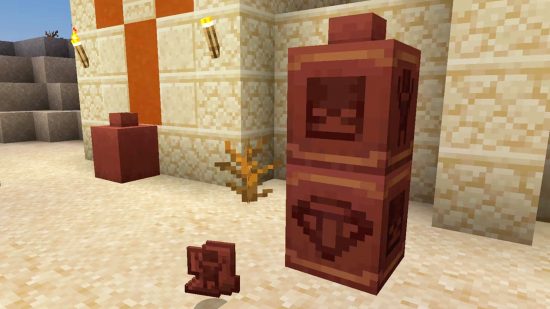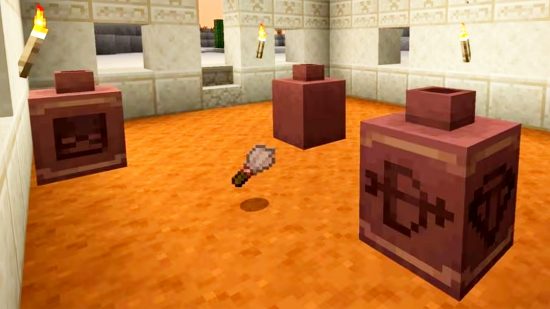What is Minecraft archeology? The Minecraft archeology system was an exciting new mechanic first announced as part of the massive Caves and Cliffs update. A number of announcements made at the same time were eventually shelved, including bundles and archeology itself, while The Warden and its Deep Dark biome were delayed as the update was split in two. This was no bad thing as it was due to the addition of so much more content than planned, and archeology made it in the end as part of Minecraft 1.20.
Archeology is a unique mechanic in the sandbox game with its own Minecraft blocks and items, essential for uncovering valuables and ancient artifacts – dust away sand to reveal Minecraft diamonds, emeralds, and pottery sherds, among other things. If you’re curious how all of this works, here’s a simple guide to getting started with Minecraft archeology.

Minecraft archeology
The Minecraft archeology system gives you another way to find certain rare items while being the only way to obtain exclusive loot. You can’t do any of this without first crafting a Minecraft brush though, but once you have one you can get to work digging through blocks of suspicious sand for treasure.
Suspicious blocks
There are millions of blocks of normal sand in any Minecraft world, so to make you go through all of that would make it almost impossible. That’s where suspicious blocks comes in. Suspicious sand can be easily mistaken for sand, but if you look carefully enough – just like a real archeologist – a slight change in color gives these blocks away.
To make things easier still, suspicious dig sites can only be found inside desert temples, desert wells, trail ruins, and ocean ruins. In trail ruins and cold ocean ruins, suspicious sand is replaced by suspicious gravel, but it works in the same way. To help you find these dig sites quicker, Minecraft seeds with large deserts near spawn are ideal, and we even have one on our list.
Once you detect a suspicious block, be careful not to break it, and only interact with it with your brush in hand. Breaking a suspicious block destroys it and the item inside, never to be seen again. However, by using your brush on the block, you can safely dust away sand until you reveal the previous item within – just be careful not to fall to your death in the Desert Temple’s explosive trap.
Minecraft Archeology loot
There are too many items to list here, but you can uncover an almost endless list of items from suspicious blocks, including dyes, seeds, candles, and glass. You might even be lucky enough to find diamonds, emeralds, and gold. However, there are some really special items that can only be uncovered from suspicious blocks, as you can read below.
Pottery sherds
Pottery sherds are the most archaeologically relevant item that you can uncover from suspicious blocks, and are small slabs of ancient pottery featuring an engraved design. By combining four of these sherds together in a diamond shape, you can craft a decorated pot to place around your Minecraft house – either as storage or simple decoration.
Each of the four sherds can be different, and the design of each corresponds to one of the sides of your pot – for example, if you place two Heart sherds and two Flow sherds together, two sides of your pot will feature a heart, while the other two will display a spiral.
Like smithing templates, their design depends on where they were found. See the locations of each listed below:
| Pottery Sherd | Locations |
| Angler Sherd | Warm ruins suspicious sand |
| Archer Sherd | All suspicious sand |
| Arms Up Sherd | All suspicious sand |
| Blade Sherd | Cold ruins suspicious gravel |
| Brewer Sherd | All suspicious sand |
| Burn Sherd | All suspicious gravel |
| Danger Sherd | All suspicious gravel |
| Explorer Sherd | Cold ruins suspicious gravel |
| Flow Sherd | Unknown |
| Friend Sherd | All suspicious gravel |
| Guster Sherd | Unknown |
| Heart Sherd | All suspicious gravel |
| Heartbreak Sherd | All suspicious gravel |
| Howl Sherd | All suspicious gravel |
| Miner Sherd | All suspicious sand |
| Mourner Sherd | Cold ruins suspicious gravel |
| Plenty Sherd | Cold ruins suspicious gravel |
| Prize Sherd | All suspicious sand |
| Scrape Sherd | Unknown |
| Sheaf Sherd | All suspicious gravel |
| Shelter Sherd | Warm ruins suspicious sand |
| Skull Sherd | All suspicious sand |
| Snort Sherd | Warm ruins suspicious sand |

Smithing Templates
Unlike Pottery Sherds, Armor Trim Smithing Templates aren’t exclusive to archeology, but specific designs are. As you can see in our exhaustive guide to Minecraft armor trims, some can be found in the Nether, others in loot chests, and one can only be found in The End. Four Smithing Templates, meanwhile, are exclusive to excavation: Host, Raiser, Shaper, and Wayfinder, all of which have a chance of appearing from trail ruins’ suspicious gravel.

Sniffer eggs
The Minecraft Sniffer won the Minecraft Live mob vote from 2022, and was added to the game with the Minecraft 1.20 update. The only way to find this rare, long-since forgotten creature, though, is to find and hatch their ancient eggs. These eggs can only be found via archeology though, so you’ll never see one unless you go hunting through some gravel and sand. (You can obtain Sniffer eggs through breeding, too, but you still need to get your first two eggs from excavation!)
Sniffer eggs are so rare that you won’t even find them in all dig sites, and specifically need to look in warm ocean ruins only. Just like turtle eggs, they hatch slowly over time once placed on the ground – but Snifflets hatch faster when placed on a moss block.
Minecraft remains one of the best PC games ever thanks to the regular annual updates like 1.20, which brought these archeology changes. Now, the next Minecraft update release date is nearly here and adds to available pottery sherds – but there are far more changes than just that. If these changes keep you coming back year after year, then there are plenty of Minecraft mods to keep you busy as well.

